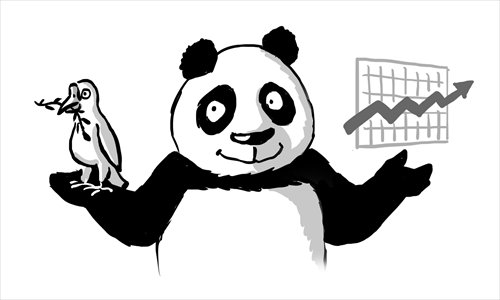Deng's peaceful approach remains China's best course

Illustration: Liu Rui/GT
Beijing will host the APEC leaders' meeting this November at a time when China's international influence and prestige are high. China's leaders should understand that at such a moment, they should seek to reassure the country's neighbors that its rise will continue to be peaceful and will not impinge on their national interests.
Frictions among Asian countries have risen in the last several years. The relationship between China and Japan has badly deteriorated. Tensions among claimants to islands, reefs, and rocks in the South China Sea have intruded on the international landscape. Nationalist leaders have assumed power in many Asian capitals, with policies reflecting patriotic pride but little tolerance for the patriotism of others or flexibility on divisive issues.
China is at a critical turning point in its development. On the one hand, decades of spectacular economic growth, accumulation of enormous foreign exchange reserves, integration of the Asia-Pacific economy with China as a hub, the development of a strong military capable not only of defending China but of projecting power, and years of peace with its neighbors have made China a regional, indeed a world, power.
Many Chinese, naturally and properly, feel that China's voice should be heard on the world stage.
But the international environment in which China has emerged is not simple. In setting China on the path to economic and military modernization three and a half decades ago, Deng Xiaoping understood that China's rise would be unsettling to its neighbors. Accordingly, along with his economic reform program, he undertook to dramatically improve China's relations with its neighbors.
The US faced similar dilemmas as it became a global power and a dominant regional power.
For a century, US strategists talked about the "Monroe Doctrine," which essentially sought to limit the assertion of influence by other powers in the Western Hemisphere.
While this may have seemed natural to Americans, it did not seem at all so to the southern neighbors of the US. The Monroe Doctrine is now consigned to the history books. That is as it should be in the modern world, however uncomfortable it may be for some Americans. The former Soviet empire in Eastern Europe has disintegrated, and attempts by Moscow to recreate it in miniature in Ukraine and elsewhere along its borders need to be pushed back.
China is not seeking to establish a Soviet-style empire. Some Chinese analysts, however, foolishly have expressed admiration for the Monroe Doctrine and seen it as a model for China to study.
I do not foresee an Asia in which China seeks to dominate the many important and proud countries on its peripheries.
But many Asians are anxious about whether China's rise, together with its economic strength, portends an effort to do so. China's leaders should show the wisdom of Deng and defuse such concerns, as Deng did in the 1970s and 1980s.
China should ensure that the dispute over the Diaoyu islands with Japan does not escalate into conflict, which would otherwise bring enormous damage to the two countries and the region.
China should make clear that its approach to territorial disputes in the South China Sea will be peaceful and non-coercive, and its claims will be consistent with international norms. Clarification of the meaning of the nine-dash line consistent with international law would be especially welcome.
China and the US should recommit themselves to a relationship of collaboration on critical international issues such as the nuclear programs of North Korea and Iran, combating the Islamic State, respect for Ukraine's territorial integrity, stability in Afghanistan, climate change and environmental protection, and energy development and security.
The nations in the Asia-Pacific region want a positive and stable China-US relationship. Our leaders need to resist the calls of hotheads and aggressive nationalists in our own countries and, instead, do not only what China's neighbors hope for, but what our two countries need.
The author was senior director for East Asian affairs at the US National Security Council from 2009-11. He is now a senior fellow at the Brookings Institution. opinion@globaltimes.com.cn